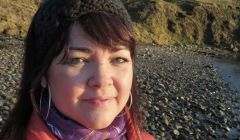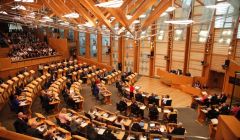Letters / Change needed in Scottish education
Open letter to Beatrice Wishart MSP
Dear Beatrice Wishart MSP
Following the tragic death of George Floyd and the global protests of his unjust death, we want to confirm that the Scottish Government is committed to dismantling any direct or indirect systems of racial prejudice or discrimination within Scotland. In particular, we are looking for the Scottish Government to commit to compulsory teaching about Black, Asian and Minority Ethnic (BAME) Groups on the Scottish Schools curriculum. We will outline our suggestions for making these improvements later in this letter.
We appreciate that the matter at hand is complex, however, the Scottish Government has recently been celebrated for leading the way in inclusive education, becoming the first country in the world to have LGBTQIA+ education embedded in the Scottish curriculum.[1] Within the teaching proposal, Scottish schools will strive to ‘tackle homophobia, biphobia and transphobia’, ‘address prejudice in relation to the LGBTQIA+ community’ and ‘promote awareness of the history of LGBTQIA+ equalities and movements’.[2]
Whilst we both champion the inclusion and necessity of LGBTQIA+ education in the Scottish curriculum, we are concerned that this same educational ambition has not been extended to addressing the discrimination which other minorities suffer in Scotland, namely Black, Asian and Minority Ethnic groups.
Currently, there is a non-compulsory teaching unit only available to students undertaking a Higher, National 4 or 5 in History, that covers a narrow scope of black history focusing on colonialism and slavery.[3]
We want to encourage the Scottish Government to expand the teaching curriculum by not only teaching about historical lives of BAME individuals, but to implement within the broad general education, the social, historical and political context of BAME experiences, as well as the increased inclusion of BAME materials by BAME creatives and academics. The Scottish schools curriculum should by no means be instating the belief that the BAME contributions to history, sciences and the arts are less valued.
Become a member of Shetland News
As two individuals who were both educated by the Scottish state in the Shetland Islands from 2001-2013, we agree that we received minimal teaching about the experiences or contributions of BAME people to Scotland. The Scottish 2011 census highlights that the Shetland Islands holds a one percent population of people whose ethnicity is within the description of Asian, African, Caribbean or Black[4], less than that of Scotland as a whole. As such, students in the Shetland Islands are not exposed to the lives, contributions and experiences of BAME individuals. This is a vital educational opportunity for the Scottish Government to provide teaching about BAME matters to underexposed populations, in order to prevent racist behaviours being entrenched as normal behaviours within communities like the Shetland Islands.
The Shetland Islands limited educational resources or exposure to BAME people means that acts of racism are frequently tolerated and promoted in our communities. As recently as 2019, the annual Up Helly Aa festival allowed men to wear black face as part of their comedy sketch performances, without repercussions from police or community members. These promoted racially discriminatory acts of black-facing have recurred year after year in Shetland’s cultural festival. The act of blackfacing in these performances marginalises our existing BAME communities within the Shetland Islands and promotes racist hostility toward any visiting BAME people.
We believe that this example is just one of the many acts of racism which has been allowed in the Shetland Islands. As the festival of Up Helly Aa is extensively promoted as a significant cultural event across the Shetland tourism board, we want to extend an invitation for the Scottish Government to prohibit the act of blackfacing or any signs of tolerance towards racist ideals in the Shetland Islands and across Scotland.
To begin to make a difference to the lives of BAME individuals living in Scotland, we believe it is imperative for educational changes to be made. Below we have outlined some of our suggestions for the steps to be taken to make this necessary change:
- Ensuring that educators of a Scottish curriculum are educating about the challenges related to racism. An Intercultural Youth Scotland study found that when asking teachers across Scotland the question ‘Teachers at my schools were aware of challenges related to racism and discrimination’ only 13.3% of male respondents strongly agreed with the statement, compared to just 3.8% of female respondents.[5] We believe that all education degrees or teaching qualifications in Scotland must have an up-to-date mandatory course on how educators should be made aware of the challenges related to racism and discrimination.
- Creating a more diverse teaching workforce in Scottish schools. Within Scotland in 2016 93.5% of teachers were indigenous white. Little is known about the 1% of teachers from the BAME population. In terms of the ethnicity of the pupil population across Scotland 3.3% of pupils are from BAME backgrounds.[6] The Scottish Government must do more to create more opportunities for the BAME population to be in educational roles. The importance of employing members of the BAME population has been shown to provide: role models for children of all ethnicities and improve academic outcomes for BAME students.[7] Therefore we want the Scottish Government to commit to diversifying the teaching workforce in every school in Scotland.
- The Scottish Government should implement within the broad general education: the social, historical and political context of BAME experiences, as well as including the voices and materials of BAME people across the arts and academic fields of study.[8]
We believe implementing these changes are an essential step in sincerely working towards equality for the people of the BAME population of Scotland.
We understand the difficulties that the Scottish Government currently face with the impacts of the COVID-19 pandemic, and the impact this will have across Scotland. However, we feel this change in curriculum is still an imperative change that is owed to better the lives of Scotland’s BAME communities, who are disproportionately harmed by COVID-19.[9]
We cannot allow Scotland to continue to neglect its ethnic minority population and must act accordingly to make this change effectively and swiftly.
Billy Kay – Legal Student, University of Bristol
Megan Nicolson – Staff Nurse, St George’s Hospital, London
References:
[1] https://www.theguardian.com/education/2018/nov/09/scotland-first-country-approve-lgbti-school-lessons
[2] https://www.gov.scot/news/lgbti-education/
[3] https://www.sqa.org.uk/files_ccc/HigherCourseSpecHistory.pdf
[4] https://www.scotlandscensus.gov.uk/documents/council_area_profiles/Shetland_Islands.pdf
[5]https://static1.squarespace.com/static/5b9aaa1c0dbda3921bdda433/t/5dc2cdb26ad765150b8959c1/1573047736181/IYS_EDI_Report_Artwork_1_1.pdf
[6]https://www.gov.scot/publications/teaching-diverse-scotland-increasing-retaining-minority-ethnic-teachers-scotlands-schools/pages/15/
[7] Ana Maria Villegas & Jacqueline Jordan Irvine. ‘Diversifying the Teaching Force: An examination of the major arguments.’ in Urban Review (2010)
https://link.springer.com/content/pdf/10.1007/s11256-010-0150-1.pdf
[8]https://www.bustle.com/p/what-they-dont-teach-at-school-a-black-british-history-resource-list-22961784
[9] https://www.nhsconfed.org/resources/2020/04/the-impact-of-covid19-on-bme-communities-and-staff
Become a member of Shetland News
Shetland News is asking its readers to consider paying for membership to get additional perks:
- Removal of third-party ads;
- Bookmark posts to read later;
- Exclusive curated weekly newsletter;
- Hide membership messages;
- Comments open for discussion.
If you appreciate what we do and feel strongly about impartial local journalism, then please become a member of Shetland News by either making a single payment, or setting up a monthly, quarterly or yearly subscription.







































































